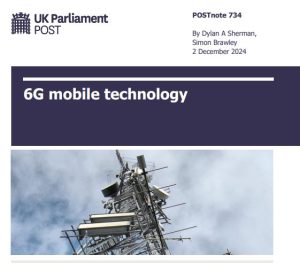
By Dylan A Sherman,
Simon Brawley
2 December 2024
Overview
• 6G is the next generation of wireless communication technology after 5G. Compared to the current generation, 6G is expected to be more responsive, reliable, faster, and have a higher rate of data transferable at any one time.
• 6G is expected to be accessible anywhere, secure, energy efficient, and compatible with various networks such as 5G, Wi-Fi and satellite.
• Technologies such as sensing, artificial intelligence, the Internet of Things, and cloud computing will be important technologies for 6G.
• 6G may increase adoption of autonomous vehicles, smart city technology, manufacturing, virtual and augmented reality, remote surgery, and more.
• In 2023 the UK Government released the 6G Strategy that committed an initial £100 million for 6G research.
• The UK is a global research leader, but stakeholders see a need to better commercialise technology from research.
• Policy commentators warn that limited technology development reduces influence over international standards, which can produce a negative feedback loop, possibly weakening domestic industries.
• Significant resources are needed to engage in 6G standards creation. Some commentators say that coordination between small to medium enterprises, researchers, and related stakeholders is needed to maximise UK influence.
Continue reading 👉 Background https://researchbriefings.files.parliament.uk/documents/POST-PN-0734/POST-PN-0734.pdf?

